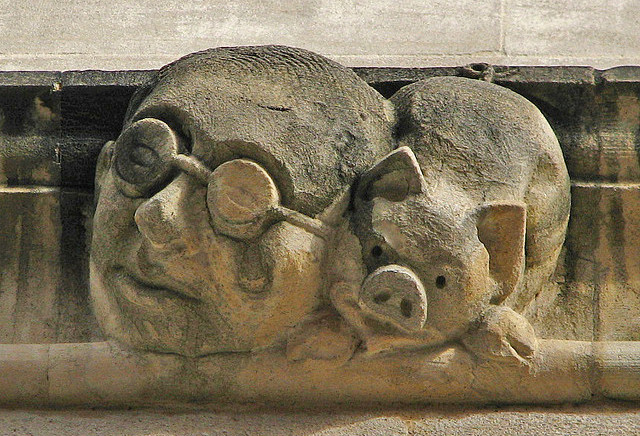
In Satan We Trust
The Jeffersonian notions of religious toleration and liberty on which the United States was founded have, in recent years, become a tool for the Christian Right to resist socially progressive changes to the law. One of its latest manoeuvres has been to call on religious liberty laws to block socially progressive legislation. This was the case in Burwell v. Hobby Lobby, used to chip away at the Affordable Care Act, which mandates employers to provide their workers with contraception as part of their healthcare plans. In that case, earlier this year, they were successful: the Supreme Court ruled in favour of overturning the clause in question, having been swayed by the claims of the arts and crafts company Hobby Lobby and its Evangelical owners.
Following on from the Citizens United case, which, in 2010, gave corporations the same rights of free speech as individuals, this ruling provides corporations with similar religious rights to those of the individual. Justice Ruth Bader Ginsburg, who was among the four dissenters on the court, has claimed that, in extending those rights, “the court […] has ventured into a minefield” – for it has, in some cases, elevated the religious rights of a corporation above the individual rights of the corporation’s female employees. How far might the idea of religious exemption from the law be taken? Might Jehovah’s Witnesses refuse to fund healthcare plans that provide blood transfusions, or Scientologists be given the right to preclude the use of antidepressants? And might religious exemption even be granted to organisations which represent the occult?
Enter the Satanic Temple. After the majority opinion on the Court backed the argument for religious exemptions to the law, the Satanic Temple has sought to twist and contort this precedent in order to open up a whole new theatre of discourse within American politics. The standard set down in the Hobby Lobby case has given the Temple grounds to challenge the restrictive and conservative nature of Missouri’s abortion laws. (The state has mandated that, prior to an abortion, doctors are obliged to provide women with information that is not wholly scientifically incontrovertible, such as warnings of prenatal pain in unborn babies.)
In attempting to force the extension of religious liberty principles to those with unconventional religious views, the Satanic Temple is shining a spotlight on the underlying standards prevalent in American politics, which, in reality, privilege a certain kind of religious dogma. One needs only to look at the scramble in the Republican Party over the presidential nomination to see how the American project of religious toleration has gone awry. It is seemingly impossible for any individual politician to gain nomination and election for high-ranking office without their having uttered the words ‘Now I’m a person of faith’. Considering the composition of the federal government, it is clear what kind of faith they mean: in a Judeo-Christian God. To be Muslim, conversely, is to be unfit to hold the office of President – at least, according to Ben Carson, a man who wants to be President himself. What was once religious liberty is now religious privilege, serving as a key accessory to a political resumé. In this respect, the Satanic Temple’s message is clear. There are plenty of interest groups that exist in order to lobby and promote the interests of the religious Right; the Satanists are attempting, they say, to lobby in favour of “atheistic” values.
The Satanic Temple’s legal challenge, such as it is, does not pertain to any specific doctrine or principle underpinned by the Satanic creed itself. Although Satanism may conjure up images of pagan rituals and figures from Milton and Dante, its core beliefs may simply be seen as a rejection of the messages of compassion and moderation found within a large chunk of Christian teachings. Rather than turning the other cheek, the practising Satanist will seek vengeance; rather than observing restraint, they will indulge in hedonism. At least, these are some of the tenets outlined within the ‘Satanic Bible’, and here lies the split between the modern Satanic Temple and the theology of the eponymous creed. The Satanic Temple, as an organisation, and its leader, Lucien Greaves, have no interest in actually promoting a Satanic view of humanity or any of the occult imagery that surrounds it. Instead they have chosen to focus on what Greaves, speaking to VICE in 2013, described as an “atheistic philosophy”, in which “non-believers have just as much right to a religion”.
It is ironic that an organisation that claims to be rooted in atheistic and secular principles is striving for the same legal and political privileges given to the religious organisations it opposes, as well as seeking to achieve this by employing the same tactics as those on the religious Right. With this self-defeating paradox of an argument, they are illuminating a hypocrisy: they are condemning the integration of religion and politics, yet have been forced by political expediency to appeal to the label of religion to achieve political influence. Giving the Satanists the same political opportunities as Christian interest groups might restore a sense of the need to separate church and state.
As might be expected, the Satanists are fighting an uphill battle. While their cause may seem wholly legitimate to some Americans, the tag of Satanism has, naturally enough, alienated many people. A similar Satanic gambit has been to suggest that, given the erection of a statue of the Ten Commandments in the Oklahoma State Capital, it is only fair that a statue of the occult deity Baphomet also be erected, in the name of respect for the inclusion of religious minorities. This is hardly an exercise in how to win friends and influence politics. And while the case of Missouri’s abortion laws seemingly stands a greater chance of success than that of the Baphomet statue, the latter is typical of the Temple’s actions and their satirical objectives.
The Satanic Tample is not in the business of successfully instilling Satanic dogma into American politics: it is trying to point out the ironies inherent within the American political system – and in doing so, to engender a greater emphasis on secular politics. It is almost inconceivable that such a lobby will match the political and financial clout of the American Christian Right in the near future. So, for now, it looks as if they might have to be content with playing devil’s advocate.
Image: Tambako the Jaguar (license)







